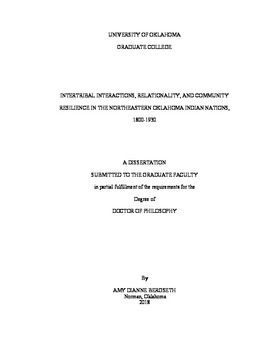| dc.description.abstract | My research explores nation building among the nine small American Indian nations located in northeastern Oklahoma after forced removal. The distinct sovereign small Native nations who relocated to the corner of the state included the Myaamiaki (Miamis), Mō´dokni Máklaks (Modocs), Odawa (Ottawas), Peewaaliaki (Peorias), Okáxpas (Quapaws), Shotinontowane'á:ka and Kaion'kehá:ka (Senecas and Cayugas), Šaawanwaki (Shawnees and Eastern Shawnees), and Wandat (Wendat/Wyandot(te)s). My research explores nation building and intertribal interactions among these small American Indian nations and how they maintained their communities and interacted with each other and the outside world. Relational sovereignty assisted the small Native nations in their persistence and maintenance of their communities. After forced removal devastated and disrupted Native relationships to the land and each other, indigenous peoples responded by rebuilding their values and traditions. Relationality—the idea of being related or connected, having relationships with one another—augmented and provided synergy and strength for Native sustainability and sovereignty, the independent power and authority. Ironically, it was the continuation of building relationships with each other that afforded tenacity, perseverance, and resilience for the small nations, allowing for the maintenance and continuity of their distinct and sovereign cultures and traditions.
Relationship building and kinship were key to maintaining political and cultural sovereignty in post-removal northeastern Oklahoma. The history of the relationships and intertribal interactions of these minor Native nations underscore the significance of relationality to tribal sovereignty, past and present. Despite their smaller citizenship populations, land bases, and business infrastructures, these Native nations used relationships to each other to provide resilience, strength, and power for the maintenance of their cultures and identities in post-removal northeastern Oklahoma. | en_US |
